7 Accounting Mistakes UAE Entrepreneurs Make and How to Avoid Them

Introduction
Running a business in the UAE is exciting. New customers. New markets. New ideas. Then the numbers start to lag behind. We see the same pattern again and again. A few small accounting mistakes grow into big headaches. The good news is that each mistake has a simple fix. In this guide, we unpack the seven errors we see most often, show you what they look like in real life, and give you checklists you can use today.
Why these seven mistakes keep showing up
Most founders do not start a company because they love bank reconciliations. We get that. The pressure of sales and delivery pushes finance to the side. That is when habits slip. Receipts sit in inboxes. Bank feeds do not get checked. Invoices go out late. Tax dates sneak up. The fix is not a complex system. The fix is a small set of steady routines that the team can follow every week and every month.
Entrepreneurs who use accounting and bookkeeping services Dubai often find that these routines become second nature, reducing errors and saving time. Similarly, an accounting services company can help founders implement these habits early.
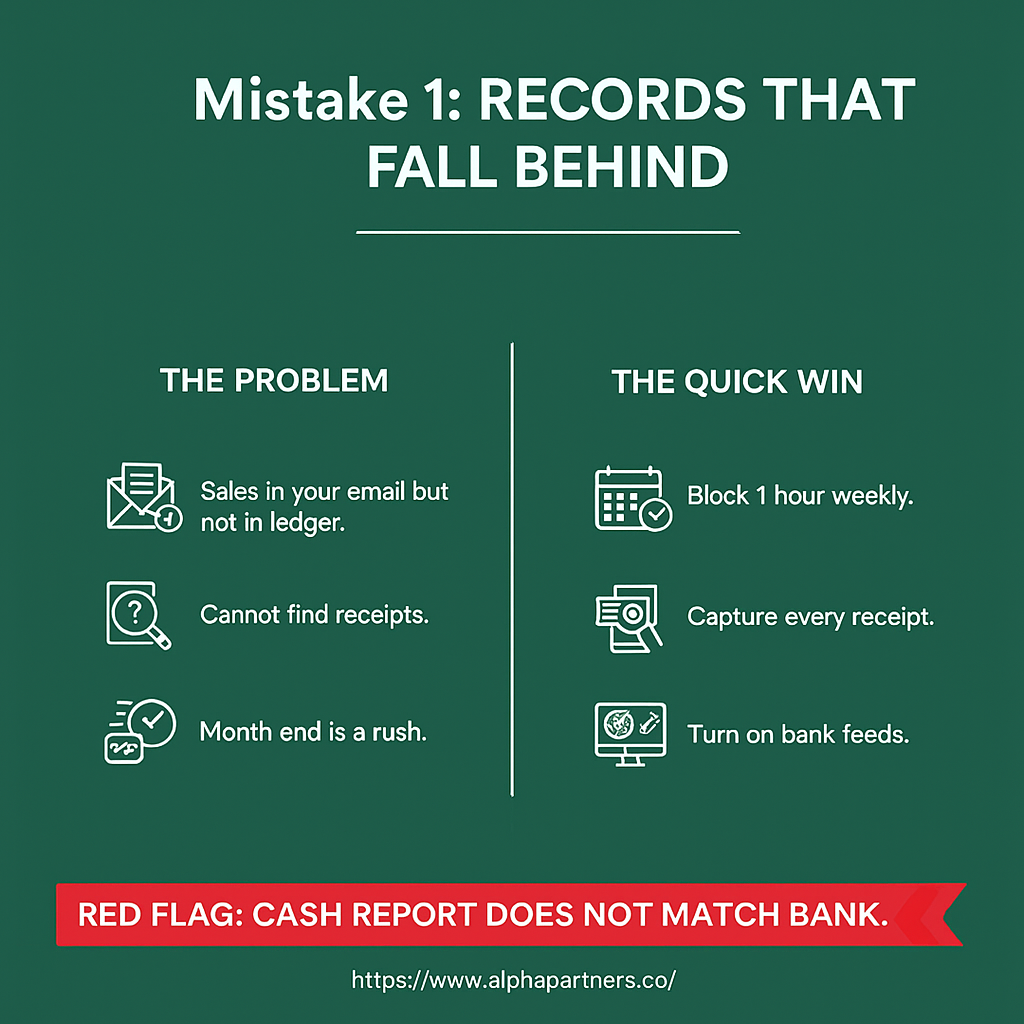
Mistake 1: Records that fall behind
When records fall behind, decisions drift. You do not know what you can spend. You do not see who owes you. You cannot trust your reports.
What this looks like
- Sales are in your email but not in your ledger.
- Supplier bills are paid but not recorded.
- You cannot find receipts when you need them.
- Month end becomes a rush to fill gaps.
The quick win
- Block one fixed hour every week for bookkeeping. Treat it like a client meeting.
- Capture every receipt the day you spend. Phone photos are fine if you store them neatly.
- Keep invoices, bills, and bank statements in one tidy folder structure.
- Turn on bank feeds so entries flow in automatically.
A tiny weekly SOP you can paste into your team chat
- Open the bank feed and code all new transactions.
- Attach receipts to every spend from the past seven days.
- Send invoices for any completed work not yet billed.
- Check aged receivables and send friendly reminders.
- Save a backup of the ledger file or export key reports.
Red flags to watch
- Your cash report does not match your bank.
- You need more than ten minutes to find a single receipt.
- Your customers ask for invoices twice.
- You do not know your total payables for the month.
Mistake 2: Mixing personal and business money
It starts with one small purchase on the wrong card. Then a few more. Soon it is impossible to see what the business really costs.
Many start-ups solve this by hiring accounting services for small businesses to separate their records early. Local accounting firms in Dubai also recommend clear account setups to keep tax filings clean.
What this looks like
- One bank account for everything.
- One card used for personal and company buys.
- Owner cash transfers with no clear notes.
The quick win
- Open a business bank account and use it for every company payment.
- Use a business card for expenses.
- Record owner drawings and reimbursements with simple notes.
- Tag transactions as you go in your cloud tool. Five seconds now saves hours later.
A clean setup in under thirty minutes
- Create a simple chart of accounts with these buckets: Sales, Cost of Sales, Operating Expenses, VAT Control, Owner’s Drawings, Loan Accounts, Cash and Bank.
- Save two invoice templates: one for services and one for goods.
- Create two spend rules: Travel and Meals with the right tax code and project tag if you use projects.
- Set a saved report pack: Profit and Loss, Balance Sheet, Aged Receivables, Aged Payables, Cash Summary.
Why this matters for tax and audits
Separate accounts keep your audit trail clear. You will not waste time proving that a family grocery bill was not a business expense. You will not distort profit with personal items. You will keep your filings clean.
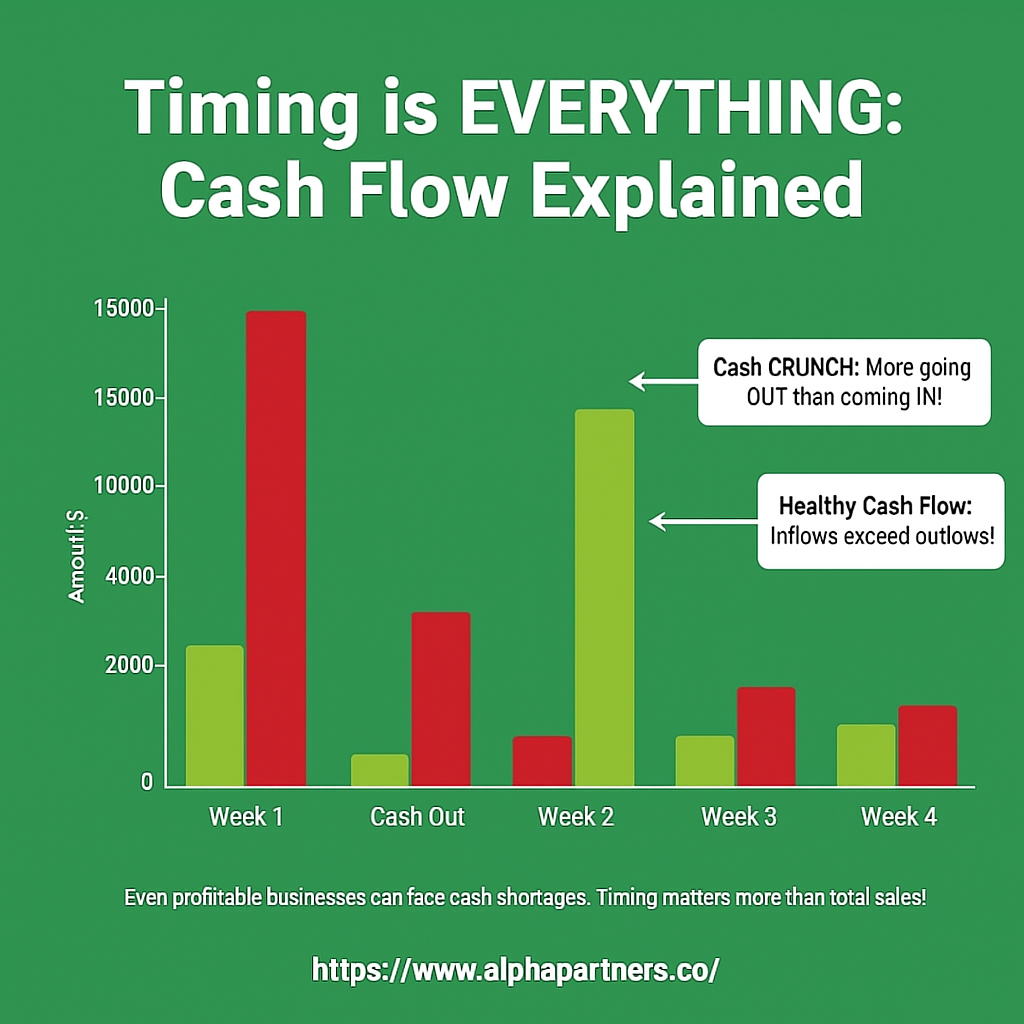
Mistake 3: Cash flow on autopilot
Profit on paper does not pay salaries. Cash is a timing game. Money in versus money out. If collections slow or bills bunch up, cash drops fast even in a good sales month.
Outsourced accounting services UAE can manage cash forecasts and reminders, while simple accounting services for small businesses keep weekly reports updated.
What this looks like
- Invoices sit unpaid past due.
- Suppliers want payment now but customers pay later.
- You do not know your cash position for next week.
- You buy stock without a clear view of sales.
The quick win
- Review a simple cash report every week.
- Keep a rolling three month forecast that shows money in and money out.
- Send polite reminders the moment invoices go past due.
- Hold a small buffer for surprise costs.
A two step cash forecast you can build in a sheet
- Cash In: List expected invoices by week and the most likely payment week. Add a small late buffer if a customer often pays a few days late.
- Cash Out: List payroll dates, rent, supplier bills, tax payments, and any planned purchases by week.
Subtract outflows from inflows, add your opening cash, and you have your weekly closing cash. Update it every Monday.
Terms that help you get paid faster
- Add clear due dates on invoices.
- Use friendly reminders at 3 days before due, on due date, and 7 days after due.
- Offer easy payment options if possible.
- For larger projects, use milestones and deposits.
Mistake 4: Misclassifying workers
Calling someone a contractor when they should be an employee can lead to penalties and disputes. This is about control, terms, and the nature of the work.
When unsure, many SMEs turn to accounting firms in Dubai or HR advisers who understand UAE labour rules. Even a one-hour consultation from an accounting services company can prevent costly missteps later.
What this looks like
- Full time hours with contractor labels.
- Company tools and supervision, but contractor pay terms.
- No written agreement.
- One person was treated differently from the rest without a clear reason.
The quick win
- Put roles and terms in writing for every person.
- Recheck status when duties change.
- When unsure, get a quick opinion from a qualified adviser in the UAE.
- Keep copies of contracts, IDs, and payment records in one secure folder.
A short status review checklist
- Who sets working hours
- Who provides tools and equipment
- Who decides how the work is done
- How long the engagement lasts
- Whether the person works for others
Your notes do not need legal language. You just need to show your reasoning.
Mistake 5: Missing tax dates
Late filings bring penalties and stress. They also pull focus away from customers and growth.
Accounting and bookkeeping services Dubai provide calendars and reminders, while outsourced accounting services UAE ensure VAT, payroll, and tax deadlines are never missed.
What this looks like
- Returns prepared the night before.
- Numbers rushed and unchecked.
- Last minute bank issues for payments.
- A diary full of reminders but no shared team plan.
The quick win
- Build one simple calendar with filing and payment dates.
- Add alerts in your accounting tool and on your phone.
- Prepare early so reviews are calm.
- For VAT, follow the same short checklist every time.
A simple VAT checklist you can reuse
- Reconcile all bank and card accounts for the period.
- Code any decoded transactions.
- Review VAT control accounts.
- Run the draft VAT report and scan for odd lines.
- Attach missing documents to transactions.
- Export the draft and save it with the period name.
- Submit and lock the period in your system.
Payment habits that prevent rush fees
- Schedule payments two days before the due date.
- Keep a small cash cushion in a separate account for tax.
- Confirm bank limits and approval steps a week before a large payment.
Need help getting your books back in shape fast
Contact Alpha Pro Partners to close the gaps and keep your filings accurate and compliant.
Mistake 6: Skipping bank reconciliations
If you do not reconcile, errors hide. Duplicate charges hide. Fraud hides. The longer you wait, the harder it gets.
Many entrepreneurs use an accounting services company for weekly reconciliations, while accounting and bookkeeping services Dubai keep balances accurate and cut fraud risks.
What this looks like
- The bank balance in your system does not match the statement.
- Old unreconciled items sitting for months.
- Duplicate entries padded into expenses.
- Refunds missing from income.
The quick win
- Reconcile every bank and card account at least monthly. Weekly is even better.
- Match each ledger entry to a statement line.
- Investigate differences right away.
- Lock the month once final so prior periods stay stable.
A reconciliation mini SOP
- Download statements for the month and place them in the Month End folder.
- Match every entry. Investigate and fix unmatched lines.
- Check that the ledger bank balance equals the statement balance on close date.
- Review the suspense account and clear it to the right categories.
- Lock the period and save a PDF of the reconciliation report.
Small controls that cut risk
- Only one person can create new vendors.
- A second person approves bills above a set amount.
- All new bank rules are tested on a single item first.
- Changes to master data are reviewed weekly.
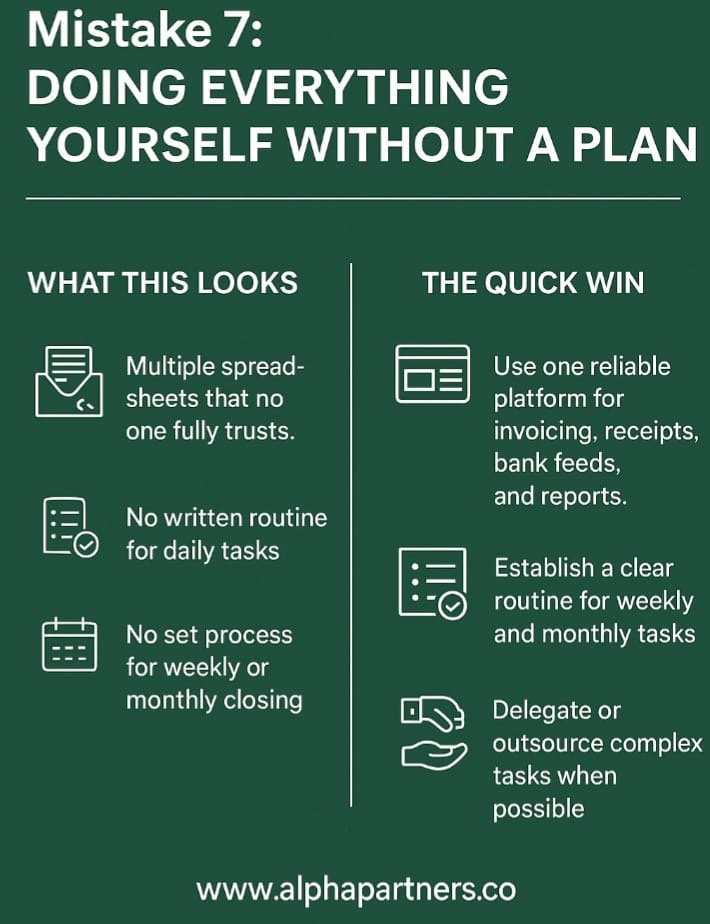
Mistake 7: Doing everything yourself without a plan
DIY can be fine with a plan. Without a plan it creates rework and missed savings. You spend Sunday nights catching up and still feel behind.
Outsourced accounting services UAE streamline reports and compliance, while accounting firms in Dubai offer quarterly reviews to help businesses scale smoothly.
What this looks like
- A dozen spreadsheets that no one trusts.
- No written routine for week end or month end.
- Reports that change names and filters every time.
- No clear owner for finance tasks.
The quick win
- Use one simple platform for invoicing, receipts, bank feeds, and reports.
- Write a step by step routine for weekly and month end.
- Book a quarterly health check with a professional so small issues do not grow.
- Hand off the tricky bits once you can.
A one page Month End Playbook
Three days before month end
- Chase missing receipts.
- Review unpaid invoices and send reminders.
- Approve bills and set payment dates.
On close day
- Reconcile all accounts.
- Review VAT control and draft the return.
- Scan the Profit and Loss for odd spikes.
- Check the Balance Sheet for mis-postings.
- Save PDFs of key reports.
After close
- Lock the period.
- List one improvement to test next month.
Make your process faster with smart tools
You do not need a complex stack. You need one system that pulls bank feeds, captures receipts, sends invoices, and gives you a clean dashboard. Keep your chart of accounts short so coding is fast. Turn on user permissions so only the right people approve bills. If you want extra hands for routine work, a light bookkeeping service for small business can cover reconciliations and a tidy monthly close while you focus on customers.
Features worth turning on
- Bank feeds with daily refresh.
- OCR for bills and receipts.
- Recurring invoices where you have subscriptions.
- Automated reminders that stay polite and on brand.
- Approval flows for bills above a set amount.
- A cash view that shows this week and next week.
Inventory, projects, and job costing in plain steps
- Link purchases to items so you track both quantities and costs.
- Use projects to capture time and expenses to a job.
- Raise progress invoices against milestones.
- Review job margins weekly while work is fresh.
A weekly rhythm your team can follow
We recommend this lightweight flow. It works for cafés, agencies, clinics, and e-commerce stores.
Every Monday
- Update the cash forecast for the next three months.
- Review new bank feed lines and code them.
- Send any invoices for work completed last week.
- Check who owes you and send friendly reminders.
Every Wednesday
- Process bills that arrived since Monday.
- Attach receipts to card spends.
- Approve payments for the following Monday.
Every Friday
- Reconcile accounts so the week is fully up to date.
- Save a weekly snapshot of cash, receivables, and payables.
- Note any issues to fix at month end.
What great looks like by the end of each month
- All accounts are reconciled to the statement date.
- VAT control accounts tie to the draft return.
- Receivables have a short list of late items with action noted.
- Payables are scheduled with clear payment dates.
- Profit and Loss has no odd spikes from miscodes.
- The Balance Sheet has no old suspense or stale items.
- The period is locked. Reports are saved. Cash is forecasted.
That is it. No drama. No surprises. Just steady control.
How We Help at Alpha Pro Partners
We work closely with entrepreneurs and SMEs across the UAE. Our support is designed to prevent mistakes and simplify accounting.
- Bookkeeping services in Dubai: Clean, accurate, and updated records.
- Corporate tax services in the UAE: Accurate filings, zero missed deadlines.
- VAT filing services: On-time submissions, compliance made simple.
- Cloud accounting services: Access your books anytime and anywhere.
- Xero accounting services: We are Xero experts, helping you get the most from the platform.
By keeping this natural and practical, we focus on supporting small businesses with real solutions, not sales talk. When you work with us, you’re not just avoiding mistakes. You’re setting up your business for long-term stability and growth.
FAQs
Do I really need a separate business bank account
Yes. It keeps records clean and makes filings and reviews smoother.
How often should I reconcile
Monthly at a minimum. Weekly is better for fast moving start-ups and retailers.
What should I keep for VAT recovery
Supplier invoices that show VAT, matched to the related expense in your ledger. Store them with the transaction so proof is one click away.
How long should I keep receipts
Keep digital copies in an organised folder structure and link them to transactions in your system.
What if cash is tight this month
Talk to suppliers early. Offer part payments. Speed up collections with reminders and small early payment perks.
When should I call a professional
If you fall behind, face a review, change systems, or feel unsure about worker status and filings. One short review now is cheaper than a clean up later.
Which tool should I use
Pick the one that connects to your bank, fits your volume, and gives you a clear dashboard. Your consistent habits matter more than the badge on the login screen.

.webp)


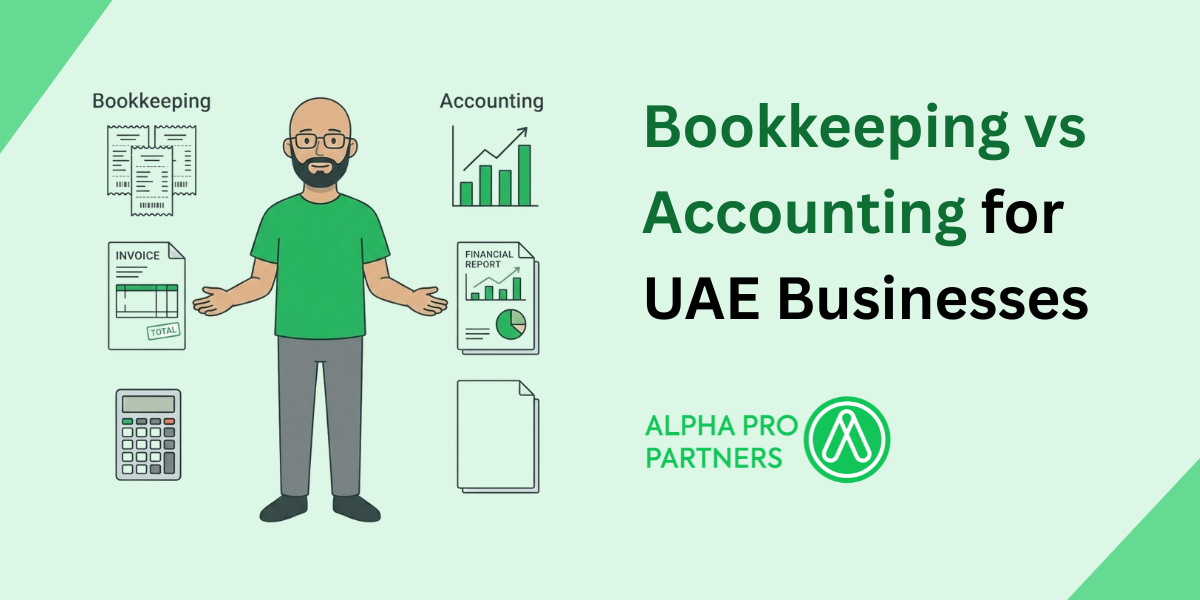


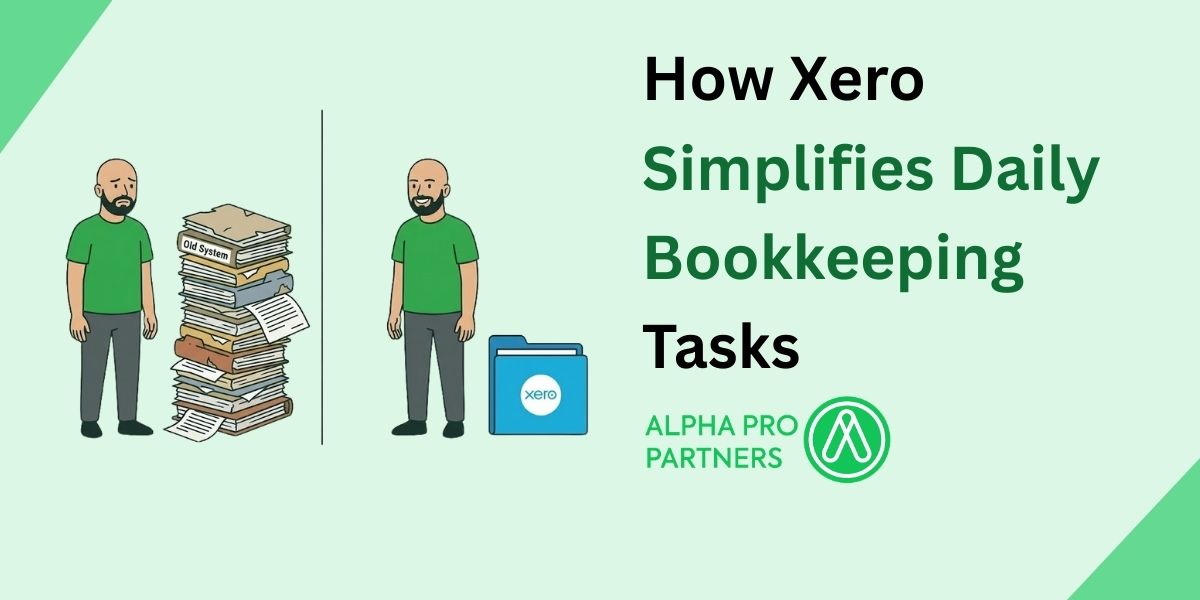
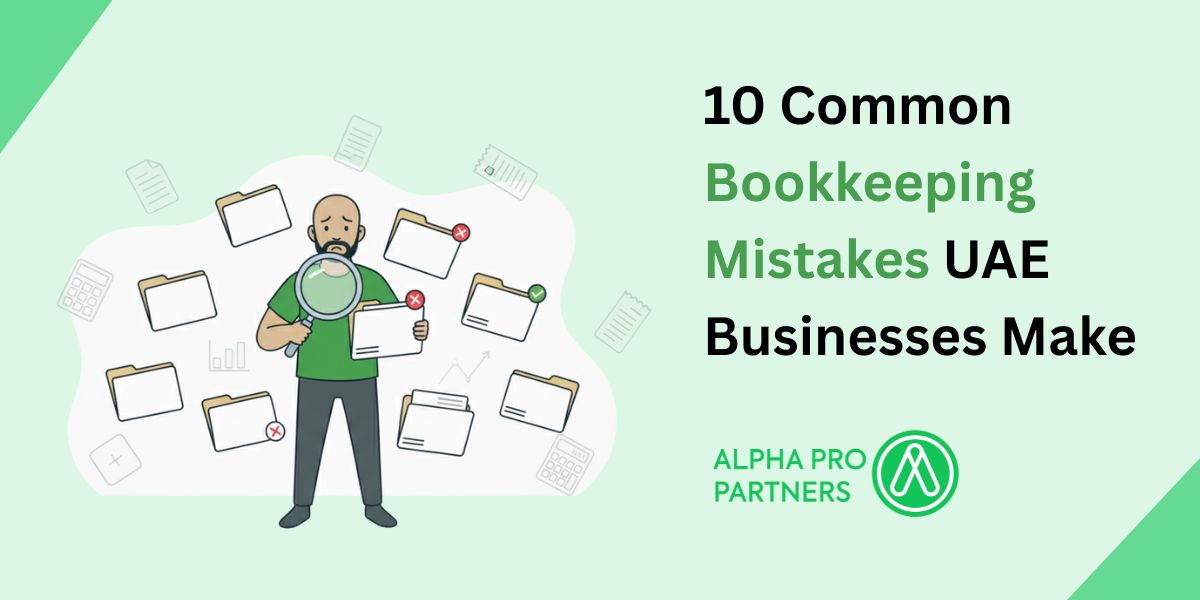
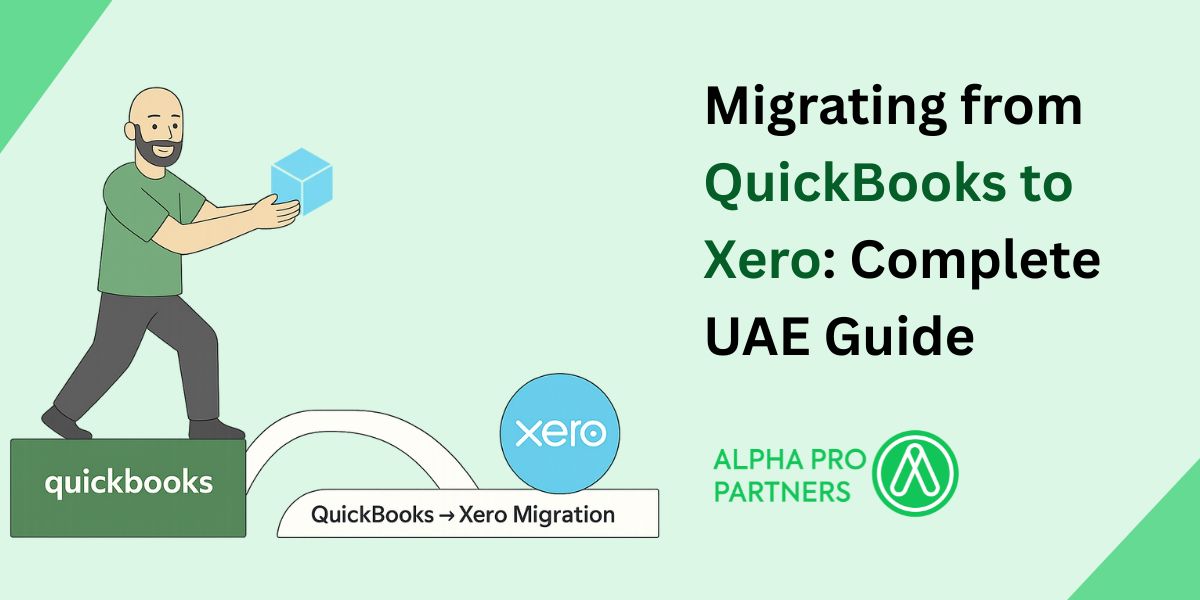








.webp)
.webp)


.png)
.png)
.png)
.png)
.png)

.png)
.png)



.png)
.png)





.jpg)


.jpg)





.png)
.png)






.png)


